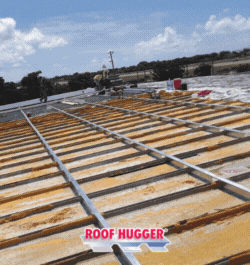UP TO THE MINUTE
Tech that transforms
May 14, 2025 at 10:30 a.m.MCS Influencer John Kenney shares the tools modern contractors need to improve their businesses.
In today’s fast-paced construction environment, staying competitive means more than just delivering quality craftsmanship — it also requires embracing technology that streamlines operations, reduces waste, improves communication and drives growth. For contractors in the metal and roofing industries, the right tech tools can mean the difference between surviving and thriving.
Technology isn’t about replacing people — it’s about empowering teams to work smarter, faster and more accurately. Whether you’re a small residential roofing company or a commercial metal contractor managing multiple crews and projects, powerful tools can improve nearly every aspect of your business. Here’s a look at the core technologies contractors should use to elevate performance and build a stronger, more efficient operation.
1 - Project management software
A modern roofing or metal contracting business can’t afford to operate on paper and scattered spreadsheets. Project management platforms centralize scheduling, budgeting, documents, communications and task tracking into a single platform. These tools allow project managers and office staff to monitor real-time progress, assign work, track change orders and reduce costly miscommunication between the field and the office.
With digital project management, contractors can improve transparency, accountability and customer satisfaction — all while minimizing downtime and improving profit margins. Some platforms also integrate with estimating and accounting software, reducing redundant data entry and improving financial oversight.
2 - Aerial measurements and drones
Roof measurement technology has come a long way. These tools allow contractors to generate accurate roof reports using satellite imagery or drone scans, saving time on on-site visits and minimizing risk. Drone inspections can document pre- and post-job conditions, identify hazards and create stunning marketing visuals.
Drones benefit metal roofers when measuring complex structures or assessing panel installation from above. They also enable safer inspections of steep or dangerous roofs without having to climb or disturb the surface physically.
3 - Estimating and proposal software
Fast, accurate estimating is critical to securing jobs and maintaining healthy margins. These technology solutions allow contractors to quickly build material takeoffs, labor estimates and digital proposals.
This software speeds up the bidding process, improves consistency, reduces errors and allows contractors to store templates and pricing histories for repeatable accuracy. Many of these tools also support visual proposals that help clients better understand the value of your work, especially for higher-end or specialty metal systems.
4 - CRM (customer relationship management) systems
Contractors who want to grow their business need to keep their pipeline organized. A CRM system helps manage leads, track follow-ups and maintain relationships with past clients. The key benefit is staying on top of communication.
CRMs let you automate follow-ups, assign tasks to your sales team and track where leads are coming from giving you the data you need to improve marketing efforts and close more deals. For metal contractors working with builders, architects or property managers, CRMs also help maintain long-term business development relationships.
5 - Field apps and mobile communication tools
Clear communication between the office and the field is essential. Mobile apps that allow crews to clock in, access job specs, upload photos and complete forms help reduce mistakes and speed up reporting.
For example, a foreperson can take a picture of an unexpected issue on a job site, annotate it in the app and instantly share it with the project manager or supplier. This keeps jobs moving without back-and-forth phone calls or waiting on emails.
6 - Digital time tracking and payroll integration
Old-fashioned time cards and manual payroll processes are time-consuming and prone to errors. Time-tracking apps allow employees to clock in and out from their mobile devices. These apps often include GPS tracking, job costing codes and integration with accounting software for simplified payroll processing.
Accurate time tracking helps with labor cost control ensures compliance with labor laws, and reduces disputes over hours worked.
7 - Cloud-based document storage and access
Keeping job site photos, warranty documents, contracts and submittals in cloud-based storage allows teams to access critical files from anywhere. This eliminates the confusion of searching through emails or file cabinets and ensures that everyone — from the crew to the client — can get what they need without delay.
Since documentation is readily available, this centralized system reduces risk during closeout, warranty calls or disputes.
8 - Safety and training technology
Contractors are increasingly turning to digital tools to manage safety compliance and training, allow teams to perform digital safety inspections, track incidents and generate reports.
Online training platforms or trade association portals can help keep teams updated with certifications, OSHA requirements and ongoing education. Investing in digital safety tracking improves compliance, reduces insurance premiums and demonstrates professionalism to clients.
9 - Financial and business intelligence tools
Contractors who want to grow must have a firm grasp on their numbers. Knowing which jobs are profitable, where your overhead is growing and which crews are most efficient can help you refine operations and plan strategically for growth.
The most successful contractors in today’s metal and roofing industry aren’t just skilled with tools and materials — they’re strategic with technology. Whether streamlining the sales process, improving project delivery or keeping teams safe and connected, the right digital tools can dramatically improve your operations.
Technology doesn’t have to be overwhelming. Start small — focus on the areas causing your business the most friction. As you adopt new systems, involve your team in the process and don’t be afraid to invest in training. The contractors who embrace these tools are the ones who will win more jobs, run more efficiently and grow stronger businesses in the years to come.
John Kenney is the CEO of Cotney Consulting Group. See his full bio here.


















Comments
Leave a Reply
Have an account? Login to leave a comment!
Sign In